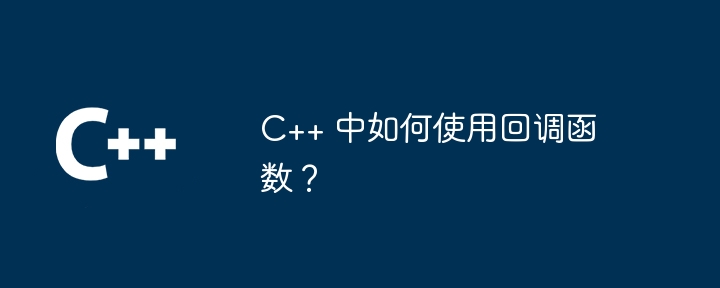
Callback functions in C are implemented through function pointers or lambda expressions: Function pointer: define type void(*CallbackFunction)(int); register callback function: RegisterCallback(callback); call callback function: CallCallbacks(value); Example: The event handling class registers the callback function and triggers the event. Lambda expression: Register callback function: RegisterCallback(std::function

Usage of callback function in C
The callback function allows the function to return control to the caller, and then in some A function that is executed again when the condition is met. This is useful in event-driven programming, where one event may trigger multiple actions.
In C, callback functions can be implemented through function pointers or lambda expressions.
Use function pointers
// 定义一个函数指针类型
typedef void(*CallbackFunction)(int);
// 注册回调函数
void RegisterCallback(CallbackFunction callback) {
// 将回调函数存储在列表中
callbackList.push_back(callback);
}
// 调用回调函数
void CallCallbacks(int value) {
for (auto callback : callbackList) {
callback(value);
}
}
// 实战案例:事件处理
// 定义一个事件处理类
class EventHandler {
public:
void OnEvent() {
// 调用注册的回调函数
CallCallbacks(42);
}
};
// 创建事件处理类实例
EventHandler eventHandler;
// 订阅事件的回调函数
RegisterCallback([](int value) {
std::cout << "事件处理程序: " << value << std::endl;
});
// 触发事件
eventHandler.OnEvent();Use lambda expression
Lambda expression was introduced in C 11, which provides a A concise way to define anonymous functions.
// 注册回调函数
void RegisterCallback(std::function<void(int)> callback) {
// 将回调函数存储在列表中
callbackList.push_back(callback);
}
// 调用回调函数
void CallCallbacks(int value) {
for (auto callback : callbackList) {
callback(value);
}
}
// 实战案例:用户输入
// 创建一个获取用户输入的函数
std::string GetUserInput() {
std::string input;
std::cout << "输入一些文本:" << std::flush;
std::cin >> input;
return input;
}
// 订阅获取用户输入后的回调函数
RegisterCallback([](int value) {
std::cout << "用户输入了:" << GetUserInput() << std::endl;
});
// 获取用户输入
GetUserInput();The above is the detailed content of How to use callback functions in C++?. For more information, please follow other related articles on the PHP Chinese website!
 The difference between typedef and define
The difference between typedef and define
 Usage of typedef in c language
Usage of typedef in c language
 What are the differences between c++ and c language
What are the differences between c++ and c language
 Recommended learning order for c++ and python
Recommended learning order for c++ and python
 Cost-effectiveness analysis of learning python and c++
Cost-effectiveness analysis of learning python and c++
 Is c language the same as c++?
Is c language the same as c++?
 Which is better to learn first, c language or c++?
Which is better to learn first, c language or c++?
 The difference and connection between c language and c++
The difference and connection between c language and c++




